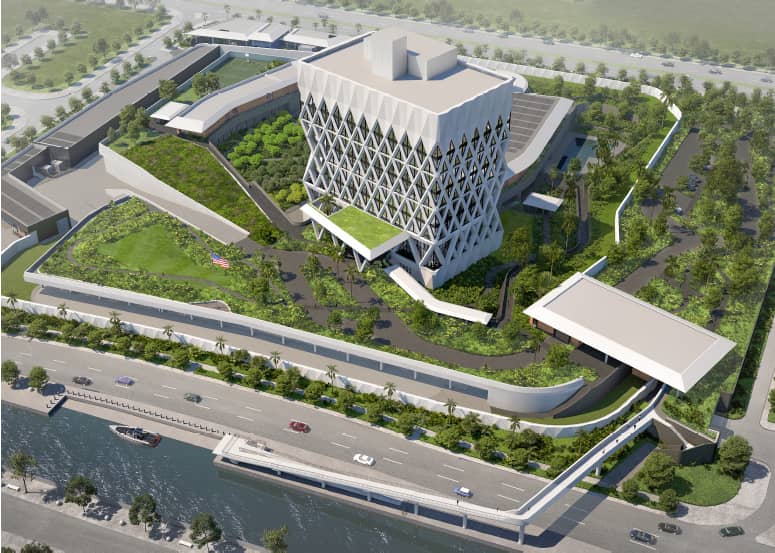The United States (U.S.) Embassy in Nigeria has set the target of 2027 to deliver its $537 million new consulate building in Lagos.
Situated on a 12.2-acre site in the rapidly developing Eko Atlantic City, the new U.S. Consulate building will support diplomatic and commercial relations between the United States and Nigeria and will provide American and Nigerian Consulate employees with a safe, secure, sustainable, and modern workplace.
The $537 million project is expected to directly benefit the Nigerian people. Throughout the project, an estimated $95 million will be invested in the local economy, and the project will employ approximately 2,500 Nigerian citizens, including engineers, architects, artisans, construction workers, and administrative staff. These workers will have the opportunity to learn new technical skills and safety awareness that will help distinguish them in the local market.
Read Also: Terrorist Attacks: NANTA urges activation of red alert
The construction project targets Leadership in Energy and Environmental Design (LEED) Silver Certification, a globally recognised designation for achievement in high performance, best-in-class, green buildings and incorporates many features designed to make the building more sustainable.
Ennead Architects LLP of New York is the design architect, Pernix Federal, LLC of Lombard, Illinois, is the design/build contractor, and EYP, Inc. of Albany, New York, is the architect of record.
The construction project will take approximately five years, with completion expected in 2027 The Trumpet gathered.
Speaking at the groundbreaking ceremony, U.S. Ambassador to Nigeria, Mary Beth Leonard, expressed appreciation to the Government of Nigeria and the Lagos State Government for their support.
She said that the new consulate in Lagos would provide American and Nigerian consulate employees with a safe, secure, sustainable, and modern workplace.
Also, U.S. Consul General in Lagos, Claire Pierangelo, said both countries had a long-standing history of people-to-people engagement which fostered bridges.
She stressed that the U.S. was looking forward to the many accomplishments that would continue to be achieved with Nigeria in the future.
“Our vision for this remarkable Consulate campus is to create a facility that both honours the vibrant relationship between the United States and Nigeria and communicates the spirit of American democracy, transparency and openness.
Upon completion, the 10-storey building will be the largest U.S. consulate in the world and our goal is to achieve leadership in energy and design,” she said.
Elated Lagos State governor, Babajide Sanwo-Olu said the construction of the largest U.S. consulate in the world in Lagos was an indication of the importance of U.S.-Nigeria relations and Lagos in particular.
He said the groundbreaking project would bring a new chapter in the bilateral journey of both countries.
He said: “When it is completed, it will present new opportunities for Nigerians and Americans that will come into this facility.
“The consulate design also highlights a great deal of thorough and meaningful collaboration between local and international designers and the careful selection of symbolic Nigerian and American elements is truly inspiring.
“It is not about the aesthetics of the project alone but also the functionality, sustainability and focus on local collaborations.”
Also, the design/build contractor of the project, Chief Executive Officer, Pernix Group, Nidal Zayed said that an estimated $95 million would be invested in the local economy in executing the project which would employ approximately 2,500 Nigerians.
This, he said, will include engineers, architects, artisans, construction workers, and administrative staff.
“These workers will have the opportunity to learn new technical skills and safety awareness that will help distinguish them in the local market,” he added.
The construction targets Leadership in Energy and Environmental Design (LEED) Silver Certification – a globally recognised designation for achievement in high performance, best-in-class, green buildings.
It also incorporates many features designed to make the building more sustainable.






